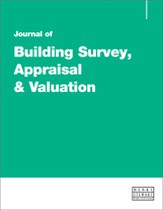Residential property evaluation and climate change modelling
Abstract
Climate change poses a first-order threat to human civilisation and governments across the world, their agencies and big and small corporations have announced climate emergencies and made commitments towards net zero emissions across a range of target dates. Regulators have tasked financial institutions in the insurance and banking sectors to expose their existing portfolios and lending practices to scrutiny as to resilience levels, preparedness and knowledge base relating to property risk level impacts from existing and emerging climate-driven property perils. The scope of these investigations has mobilised a range of consultancies and emerging climate service providers (CSPs) to support regulatory oversight and provide modelling input relative to expertise in a range of environmental issues driven by climate change. The combination of global emission scenarios and general circulation models (GCMs) with existing expertise in modelling real-world problems such as flooding, coastal erosion, storm and subsidence has produced forward-facing forecasts across the natural physical and societal risks. The regulatory results at portfolio levels have necessitated financial institutions scenario planning down to property address levels to assess overall scale of impacts and the possible provisioning requirements against multiple probabilities over decadal horizons out to 2100. These high-level assessments will in the next few years feed directly into valuation and property investigation for origination loans and the cash buyer. CSPs will inevitably seek to monetise a return on their investment in modelling for financial institutions and their unique exposure to portfolio-level provisioning as consultants to these organisations reporting to the regulator. How this data at a property level is interpreted spatially and temporally will be a unique new challenge for chartered surveyors and other property professionals within lending institutions and within the conveyancing sector. This paper looks at the development of portfolio-level climate change reporting, the scientific basis for decisioning and the real risks of assuming that scenario precision produces accurate climate outcomes at the property level. A range of evolving rule sets are proposed for lenders, valuation specialists and conveyancers to ensure reporting is fit for intended purpose.
The full article is available to subscribers to the journal.
Author's Biography
Michael Lawson is Chief Executive of Property Risk Inspection Ltd and is MRICS, a Chartered Biologist and Member of the Academy of Experts. He has 30 years’ experience as a surveying professional and has appeared in all the UK courts as Expert Witness on matters of professional and expert liability in negligence relating to property.
Graeme Winser is Strategy Director of Property Risk Inspection Ltd and is MRICS and Chair of the RICS Valuation Committee. He has 40 years’ experience as a surveying professional and has held Chief Valuer, Head of Risk and Head of Development roles for the UK’s largest lenders and corporate survey companies.
Citation
Lawson, Michael and Winser, Graeme (2022, December 1). Residential property evaluation and climate change modelling. In the Journal of Building Survey, Appraisal & Valuation, Volume 11, Issue 3. https://doi.org/10.69554/XFCK3592.Publications LLP
